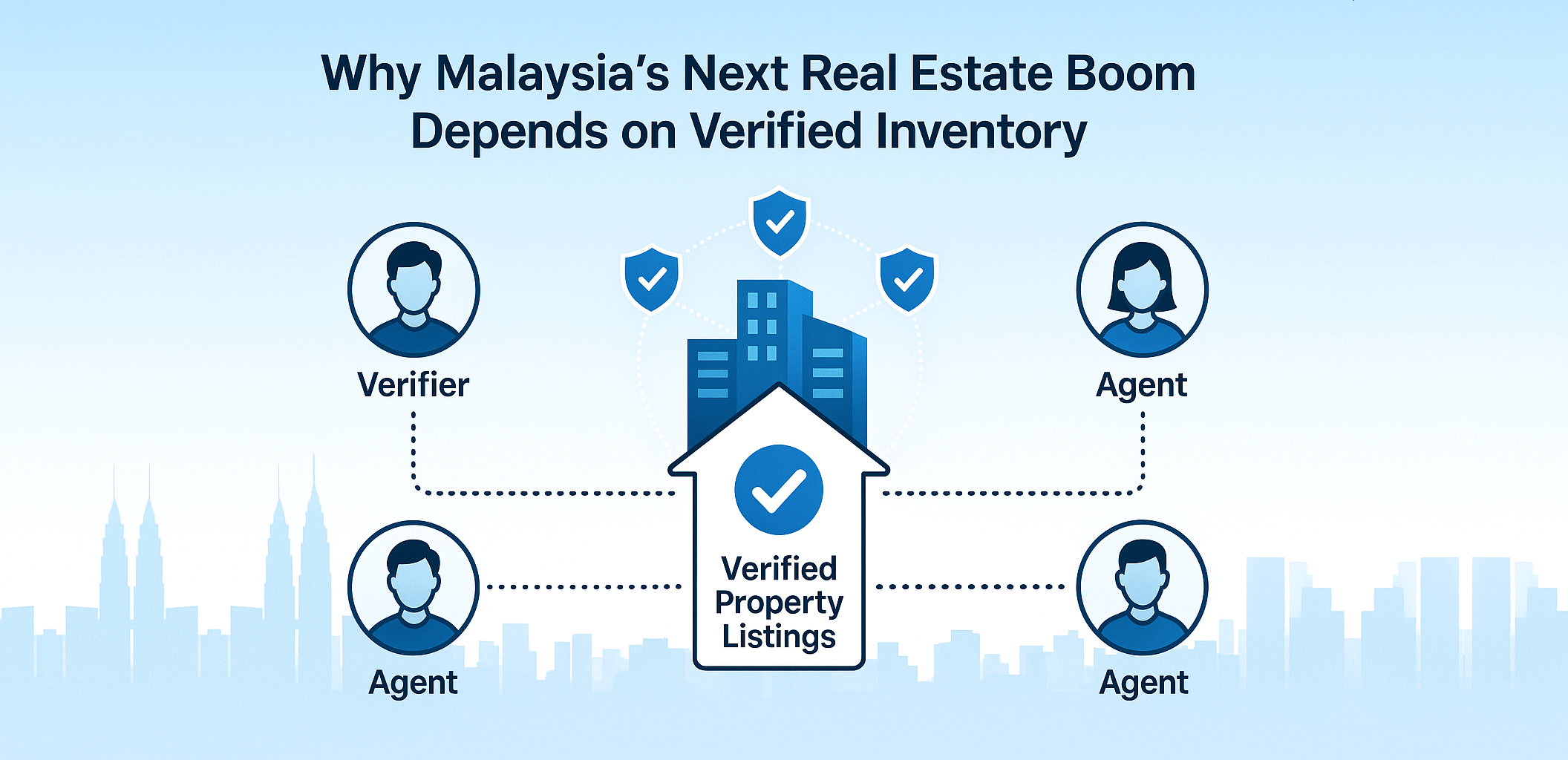Why Malaysia’s Next Real Estate Boom Depends on Verified Inventory

When Malaysia’s property market finally rebounds, it won’t be driven by hype, hashtags, or headline GDP growth. It will be driven by trust — specifically, trust in verified inventory.
For decades, our industry has run on loose listings, verbal promises, and duplicated data. The result? Inflated supply, confused buyers, and wasted time for every serious agent. If Malaysia wants a genuine real-estate revival — not another speculative spike — the foundation must shift from quantity of listings to quality of verification.
1. The Current Crisis: Too Many Listings, Too Little Truth
Every agent knows the reality:
- The same unit appears on ten portals with ten different prices.
- Owners “testing the market” list properties they never intend to sell.
- Fake leads to waste advertising budgets and agent hours.
This noise doesn’t just frustrate buyers — it erodes confidence. When investors can’t trust what they see online, they withdraw. When buyers spend weeks chasing ghost listings, they stop searching. And when agents can’t rely on shared data, co-broking collapses.
Malaysia’s property slowdown isn’t just about interest rates — it’s about information integrity.
2. Verified Inventory: The Missing Infrastructure
A verified inventory isn’t just “approved” listings. It’s a digitally auditable record of every step that proves a property is real, available, and authorized for sale.
- Owner Authorization – A verifiable letter or e-consent linked to agent ID.
- On-Site Verification – Timestamped photos, VR tours, and keyholder logs.
- Document Checks – Title, tenancy, and encumbrance validation.
- Status Updates – Automatically marked “sold” or “withdrawn” when closed.
Once these elements are embedded in a system — not stored in WhatsApp — the market can finally move from assumption to assurance.
3. Lessons from Beike and MLS Systems
China’s Beike ACN and the U.S. MLS networks both exploded because they standardized trust.
In the U.S., agents cooperate by default because MLS data is audited and reliable.
In China, Beike’s boom came after it forced agents to verify listings with on-site photos, owner consent, and centralized updates — allowing cross-agency deals at scale.
Malaysia has never had such rails. Every portal competes on exposure, not accuracy. Every agency guards its data instead of proving its integrity. Until we fix that, co-broking remains fragile and adoption fragmented.
4. Why Verified Inventory Triggers a Boom
| Chain Reaction | Description |
|---|---|
| Buyer Confidence | Buyers re-enter when they trust listings are real and prices are justified. |
| Co-Broking Revival | Agents collaborate more when duplicate risks and disputes disappear. |
| Faster Turnover | Fewer fake listings mean more viewings that actually close. |
| Capital Returns | Investors price accurately, banks lend faster, and developers plan smarter. |
In short, verified inventory restores velocity — not by pushing ads harder, but by removing friction in every transaction.
5. ListingMine’s First Step: Group-Level Verification
While a nationwide verified inventory requires scale and resources, ListingMine has already laid the foundation at the group level.
Every Group Admin can assign a Verifier Role — a trusted member responsible for checking:
- Owner authorization or consent,
- Accuracy of property details, and
- Status updates after each transaction stage.
This ensures that listings shared within the group — whether for co-broking or internal collaboration — are accurate, verified, and trustworthy.
In other words, ListingMine allows verification where it matters most today — within the agent teams actively closing deals — while keeping the door open for macro-level integration once resources and adoption grow.
6. The Road Ahead: From Listings to Ledger
The next boom won’t be built on sentiment. It will be built on systems — where every property’s journey from listing to sale is transparent, timestamped, and trusted.
When verified inventory becomes the industry’s default, Malaysia’s property market can finally unlock:
- Institutional confidence,
- International participation, and
- Long-term price stability.
Until then, we’re still guessing — not growing.











































































































